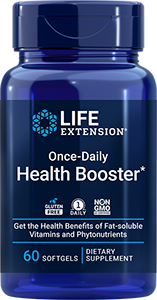- Science & Research
- Science News
- Newsletter
- 2004
- August 26

Newsletter
Newsletter
Coenzyme Q10 enhances vitamin Es reduction of inflammatory marker in primates
| ||||||||||||||||||||||||||||||
| ||||||||||||||||||||||||||||||
 | ||||||||||||||||||||||||||||||
| Life Extension Update Exclusive Coenzyme Q10 enhances vitamin E’s reduction of inflammatory marker in primates Thirteen male and eight female baboons maintained on a low fat and cholesterol diet were subsequently provided with a diet that was high in fat and cholesterol for seven weeks. Following this period, the animals were divided into four groups, three of which were supplemented with a different amount of vitamin E, and one who received no vitamin E for two weeks. Lastly, coenzyme Q10 was added to the supplementary regimen for an additional two weeks. Blood tests were conducted with each dietary phase. Predictably, the addition of vitamin E and coenzyme Q10 to the baboons’ diets elevated serum levels of these nutrients. Total antioxidant status, a measurement of the overall antioxidant capacity of blood serum, was significantly increased by vitamin E, and further increased by a slight amount with the addition of coenzyme Q10. When C-reactive protein levels were analyzed, vitamin E was found to lower levels of the marker to an average of less than half of presupplementation levels. When coenzyme Q10 was added to vitamin E, C-reactive protein levels were reduced to 30 percent of levels measured at the beginning of the study. In the discussion of their findings, the authors called the results “remarkable” given that the animals did not have an inflammatory condition at the time of the study. They conclude that “cosupplementation with vitamin E and coenzyme Q10 significantly enhanced both anti-inflammatory and antioxidant protection. These effects may in turn help protect against vascular diseases.” (Wang XL et al, “Cosupplementation with vitamin E and coenzyme Q10 reduces circulating markers of inflammation in baboons,” Am J Clin Nutri 2004;80:649-55.) | ||||||||||||||||||||||||||||||
 | ||||||||||||||||||||||||||||||
| Protocol Chronic Inflammation The pathological consequences of inflammation are well-documented in the medical literature (Willard et al. 1999; Hogan et al. 2001). Regrettably, the dangers of systemic inflammation continue to be ignored, even though proven ways exist to reverse this process. By following specific prevention protocols suggested by the Life Extension Foundation, the inflammatory cascade can be significantly reduced. A critical inflammatory marker is C-reactive protein. This marker indicates an increased risk for destabilized atherosclerotic plaque and abnormal arterial clotting. When arterial plaque becomes destabilized, it can burst open and block the flow of blood through a coronary artery, resulting in an acute heart attack. One of the New England Journal of Medicine studies showed that people with high levels of C-reactive protein were almost three times as likely to die from a heart attack (Ridker et al. 1997). Those who are in relative good health, but have elevated C-reactive protein, can try to lower it using a variety of diet modifications, supplements and/or drugs. Supplements such as vitamin E, borage oil, fish oil, DHEA, vitamin K and nettle leaf extract can lower C-reactive protein. Diets low in arachidonic acid, omega-6 fatty acids, saturated fats, high-glycemic food and overcooked food can suppress inflammatory factors in the body. If diet and supplements fail, drugs such as ibuprofen, aspirin, pentoxifylline or one of the statins (such as Pravachol®) should be tried. If the modified diet, nutrients and/or drugs lower C-reactive protein to below 1.3 (mg/L) of blood, then this is an indication that the underlying inflammatory fire has been extinguished. (The high-sensitivity C-reactive protein blood test is recommended to measure this indicator.) | ||||||||||||||||||||||||||||||
 | ||||||||||||||||||||||||||||||
Life Extension Super Booster is a multinutrient formulation that provides key ingredients that are missing from multivitamin supplements. Super Booster contains gamma tocopherol and tocotrienols, critical fractions of vitamin E that must be formulated in an oil base. Newer research has shown that these two compounds may be even more effective than the alpha-tocopherol found in powdered multivitamin mixes. Another important reason to consume the “gamma” fractions of vitamin E is that alpha-tocopherol can displace gamma-tocopherol in the body, resulting in reduced protection against free radical assault. The tocotrienols and gamma tocopherol fractions of vitamain E provide complementary benefits because they are effective on different physiologic functions. Super CoQ10 with Tocotrienols and Quercetin When CoQ10 is orally administered, it is absorbed through the lymphatic canals and distributed throughout the body. Coenzyme Q10 should be taken with some form of fat, since absorption through the lymphatic canals is greatly enhanced in the presence of dietary fat. It is for this reason that CoQ10 offered by Life Extension is available in rice bran oil softgel capsules. CoQ10 capsules with tocotrienols contain a standardized tocotrienol extract that provides a potent form of vitamin E. This CoQ10 product contains a full range of tocotrienols extracted from palm oil without the use of solvents. | ||||||||||||||||||||||||||||||
 | ||||||||||||||||||||||||||||||
Life Extension Magazine July 2004 issue Life Extension has long warned about the lethal consequences of chronic inflammation. Now the mainstream news media are finally catching up. As this TIME® magazine article notes, new research on inflammation could radically change doctors’ concepts of what makes us sick. By Christine Gorman and Alice Park | ||||||||||||||||||||||||||||||
 | ||||||||||||||||||||||||||||||
Questions? Comments? Send them to ddye@lifeextension.com or call 954 766 8433 extension 7716. For longer life, Dayna Dye Sign up for Life Extension Update at https://mycart.lifeextension.com/subscribe.asp Help spread the good news about living longer and healthier. Forward this email to a friend! View previous issues of Life Extension Update in the Newsletter Archive. | ||||||||||||||||||||||||||||||
The latest news on aging, nutrition, and vitamins
Lab
Testing
How Life Extension lab testing works

